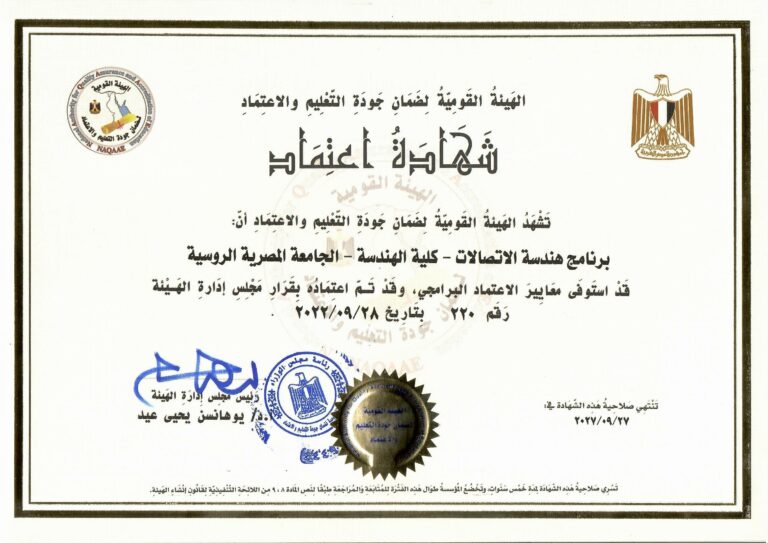يطمح برنامج هندسة الاتصالات بكلية الهندسة – الجامعة المصرية الروسية إلى احتلال مكانة بارزة بين برامج هندسة الاتصالات على المستويات المصرية والعربية والدولية، وأن يكون أحد العناصر الفاعلة في تطوير العلاقات العلمية بين مصر وروسيا.
يلتزم برنامج هندسة الاتصالات بكلية الهندسة – الجامعة المصرية الروسية بتحقيق التكامل بين التعليم والبحث العلمي وخدمة المجتمع، من خلال تقديم برنامج أكاديمي متميز يُمكّن الخريجين من المنافسة بفاعلية في مختلف مجالات العمل المرتبطة بهندسة الاتصالات على المستويين المحلي والإقليمي. كما يهدف البرنامج إلى تعزيز البحث الهندسي التكنولوجي المتقدم، وتقديم خدمات مجتمعية نوعية في المجال، وذلك في إطار منظومة جودة شاملة. وتسهم هذه الجهود في تحقيق التنمية المستدامة، وتعزيز إنتاج المعرفة، وترسيخ القيم الأخلاقية في إطار من المسؤولية المهنية والشراكة المجتمعية.
بعد إتمام البرنامج بنجاح، يُتوقع من خريجي برنامج هندسة الاتصالات أن يكونوا قادرين على:
- • تطبيق المعرفة بالعلوم الأساسية والرياضيات والمفاهيم الهندسية لتقديم حلول فعالة للمشكلات المتعلقة بهندسة الاتصالات.
- • توظيف أساليب التحليل العلمي والتصميم الابتكاري وتقنيات الإشراف في مختلف تخصصات هندسة الاتصالات.
- • تطبيق تقنيات الصيانة والتشغيل على الأنظمة المختلفة في مجال الاتصالات.
- • استخدام الأدوات التحليلية المتخصصة، وحزم البرمجيات، والأجهزة الهندسية المرتبطة بتخصص الاتصالات بشكل مهني وفعّال.
- • المشاركة في مشروعات تحسين الجودة مع مراعاة تأثيرها على المجتمع والبيئة.
• دمج عوامل مثل التكاليف المتوازنة، والسلامة، والجودة، والموثوقية، والأثر البيئي في تصميمات هندسة الاتصالات. - • توظيف مهارات الاتصال والعمل الجماعي والالتزام بالأخلاقيات المهنية للتعاون بفاعلية ضمن فرق متعددة التخصصات.
- • استخدام التقنيات والمهارات والأدوات الهندسية المناسبة واللازمة للممارسة المهنية وإدارة مشروعات التشييد.
- • استخدام التقنيات والمهارات والأدوات الهندسية المناسبة اللازمة للممارسة المهنية وإدارة المشروعات.
- • الانخراط في برامج البحث والتطوير داخل مؤسسات التعليم العالي والصناعة في مجال هندسة الاتصالات.
- • تطبيق المفاهيم الأساسية في الرياضيات والعلوم والهندسة في مجال الاتصالات.
- • تصميم أنظمة ومكونات الاتصالات مع مراعاة أداء النظام واحتياجات سوق العمل.
- • إجراء التجارب وتحليل الأنظمة الفرعية المختلفة في مجال الاتصالات.
- • تحديد المشكلات الهندسية المتعلقة بهندسة الاتصالات والعمل على إيجاد حلول فعالة لها.
- • استخدام التقنيات والمهارات والأدوات الهندسية المناسبة واللازمة للممارسة المهنية في هندسة الاتصالات.
- • التعاون بفاعلية ضمن فرق عمل متعددة التخصصات.
- • التواصل الفعال على المستويين المهني والفني.
- • فهم وتقييم تأثير الحلول الهندسية على المجتمع والبيئة.
- • تطبيق الحلول الهندسية المعاصرة في تطوير أنظمة الاتصالات.
- • إدراك المسؤوليات المهنية والأخلاقية والالتزام بها.
- • جمع البيانات بكفاءة والانخراط في التعلم الذاتي المستمر.
- • تطبيق مبادئ الدوائر الكهربائية والإلكترونية وقياساتها في تصميم الأنظمة الهندسية.
- • تنفيذ أعمال الصيانة وإصلاح أنظمة الاتصالات.
- • تطبيق نظريات التحكم، وتحويل الإشارات، ومعالجة المتغيرات الصناعية.
- • استخدام مبادئ التصميم في أنظمة الاتصالات والاتصالات المحمولة، وتقنيات التشفير وفك التشفير.
- • الإلمام الكامل بمكونات الحاسبات الداخلية والخارجية والبرمجة.
- • تطبيق مبادئ التصميم في شبكات الحاسوب والاتصالات الرقمية.
- • القيادة والمشاركة في مشروعات تحسين الجودة والتطوير.

